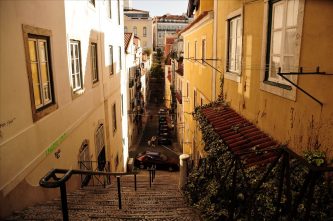GUEST POST OVERVIEW: As I prepare for my next adventure, a one-way ticket to India, I also find myself thinking about finishing the trip in Europe. So, should I find myself in Portugal, it will be great to have this info on hearing some great Portuguese guitar…aka, fado.
Portugal is a country that’s sometimes overlooked at the time of choosing a destination for our next holiday. Lisbon, is one of the most beautiful cities in Europe, that still has that air of history and importance that used to reign in the city centuries ago. It’s also a city of rich culture and folklore, and no bigger representation of that than the fado.

Portugal is one of Europe’s most underrated destinations. It’s a country that has played one of the most important roles in the history and development of Europe throughout the centuries and it used to be one of the most powerful nations in the world, due to its colonial power.
Many great men from the history of mankind have been Portuguese, such as the explorers Vasco de Gama and Bartolomeu Dias or the writer Fernando Pessoa. Lisbon, its capital, is obviously the main city in Portugal, and by renting Lisbon apartments we can find everything typical from this country, such as its architecture, art, gastronomy (very important!) and its culture, which is the subject that occupies us today.
Probably the most important expression of Portuguese folklore is the fado, a music genre that lies in sadness, despair and resignation.
The fado can be found in Portugal for the first time in the early 19th century, although experts say it probably came a lot earlier than that. With a guitar and a voice, fado brings to life stories of sadness and misery, although in modern times it doesn’t always adhere to these subjects, but any in general. The word fado comes from the Latin fatum, which means fate. There are two main types of fado: Lisbon fado and Coimbra fado, Coimbra being another city north of Lisbon, between the capital and the other main Portuguese city, Oporto. However today, we’re mainly going to talk about Lisbon fado.

Fados were always performed in spontaneous ways, mostly outdoors in public events or in taverns of the old town of Lisbon, like the Alfama and the Barrio Alto, where you can still walk around today and hear it, but not see it, the beauty of this city. But what do fados sing about? Well, as you have probably fathomed by now, fado was music that emerged from the working classes and the marginalised society, so the topics that they sang about weren’t exactly luxury and wealth.
Because Lisbon is a port city, many sailors also sung fados and longing their loved ones. A place where the fado become famous and was frequently represented was in theatres and restaurants.
Today in Lisbon, you can go to many fado restaurants in the Barrio Alto and after your delicious Portuguese meal and a few glasses of wine, the fado artists come out and start performing this beautiful music, that will engulf you into a state of trance and delight as you listen to the sad painful voice accompanied by the sweet chords of the guitar in a room lit up with candles.
Everyone who knows about fados will probably agree that the main representative of this music was Amália Rodrigues, a fado singer from the 40s up to her death who described the music as “something very mysterious that you have to feel, and you have to be born with the distressful side of people, feel like someone without ambitions, without wishes… a person… as if you didn’t exist”. Pessoa also had some words to describe fado, which was “the that the people of Portugal look at the God who they believed in with contempt, the God who had now abandoned them.
Enjoy one of Europe’s most incredible folkloric traditions in one of the most beautiful cities on the continent by renting apartments in Lisbon. The sound of fado is one that you’ll never forget.
PHOTO CREDITS:
Photopedia
About the Author: Aleix Gwilliam is a 24 year old from Barcelona who looks English but thinks like a Catalan. He enjoys travelling, especially on old Czech trains, and trying to start conversations in Hungarian with people at Pecs station, even though his Hungarian is as good as his Bulgarian, in other words, not very good. He’s a trier.
EXPLORE SOMEWHERE NEW
Nothing found.
BUY A PRINT
All photos on this site are available as limited edition fine art photographic prints. Please get in touch for sizes and rates.

